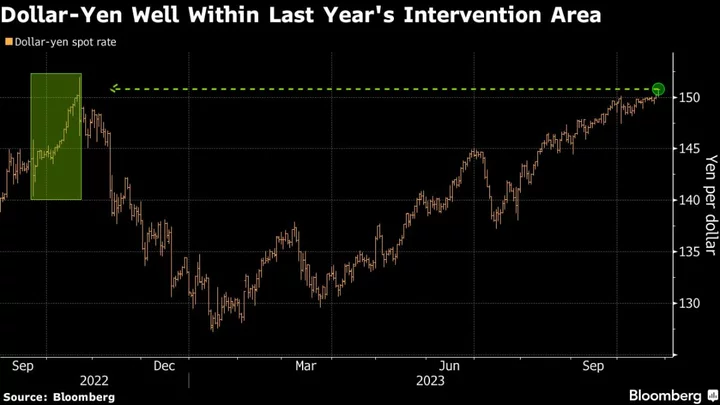A top-performing Asia stock picker is pocketing gains in Japanese exporters on bets the yen’s tumble is nearing an end, and is instead buying Chinese shares that have become cheap.
The Invesco Pacific Fund UK, which has outperformed 91% of its peers in the past year, has cut positions in exporters like Honda Motor Co. over that period, according to fund manager Tony Roberts. “I wouldn’t expect the yen to weaken much more further from here,” he said.
Roberts has added to his China holdings as “it stands out as good value on a relative basis,” he said in an interview. That’s even though shares in the world’s second-biggest economy have dropped steadily this year due to a slowdown in the nation’s growth and a slumping property market that’s showing few signs of recovery.
The Invesco fund manager’s expectation that the Japanese currency is bottoming is in line with forecasts by analysts surveyed by Bloomberg, who see the yen strengthening to 145 per dollar in the fourth quarter. The currency has been supported by speculation that the Bank of Japan may tweak its super-easy monetary policy as soon as this week, and there’s also concern that authorities might intervene in the foreign exchange market to buy the yen if it weakens too much.
For Chinese shares, Roberts is hunting for value in a market that’s had a terrible year: earlier this month the country’s equities erased all the gains seen during their huge reopening rally that started late in 2022, though they trimmed some of those losses last week.
Among the nation’s stocks, he sees opportunities in property developers whose cash holdings exceed their liabilities as those firms could pick up assets from distressed companies. Roberts also likes factory automation firms that can compete against Japanese or German rivals, and insurers who aim to grow by capturing the large uninsured population in mainland China.
Some market watchers say that the Chinese stock selloff underscores the deeply entrenched bearishness toward the market. Morgan Stanley is advising investors against buying the dip considering the fragile market sentiment and that foreign fund outflows will likely persist.
“If you look at valuations, pessimism around the economy is pretty extreme,” said Roberts, 52, who joined Invesco Asset Management in 2000. Chinese shares are trading around 10 times their one-year forward earnings compared with a ratio of about 15 times for Japanese shares, according to MSCI indexes.
The £257.5 million ($312 million) fund has been overweight Chinese equities compared with the MSCI Asia Pacific index benchmark since January 2022, and the country accounts for 20% of its portfolio, according to Bloomberg-compiled data.
Japan represents a third of the fund’s geographical allocation and Honda is still Roberts’ biggest holding from that nation. Fueled by the weakening of the yen that boosts export profits, Honda shares have risen 58% so far this year, almost triple the gains of the broader Topix Index. Despite a recent pullback, Japan’s main stock indexes have climbed over 18% so far this year, beating most of their global peers.
The currency’s depreciation plus Japan’s push to improve corporate governance have been the biggest tailwinds for the nation’s share rally so far this year, Roberts said. The Tokyo stock exchange, for example, has been urging companies to take steps to boost their market value. While he expects governance reform to continue to aid Japan’s stocks, the yen is fading as a supportive factor.
Inflation in Japan has already exceeded the BOJ’s 2% target for 18 straight months and consumer price growth in Tokyo unexpectedly quickened in October. Higher prices may add to pressure on policymakers to prevent the yen from further weakening and worsening inflation.
“The government doesn’t just have to satisfy their exporters, they’ve got to satisfy their importers and other people who will be voting for them,” the UK-based money manager said.
One of the main drivers of the yen’s decline is the big gap between yields of Treasuries, which touched 5% this month for 10-year bonds versus about 0.88% for its Japanese counterpart. But that differential is “more likely to shrink than widen,” another reason why the yen’s weakness may be contained, Roberts said.
--With assistance from Aya Wagatsuma, Yumi Teso and John Cheng.









